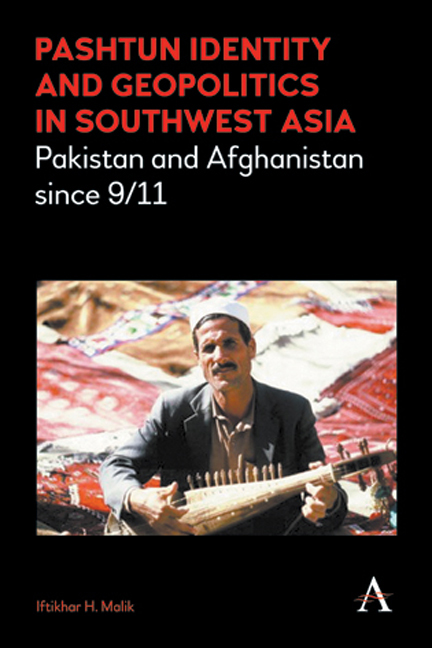Book contents
- Frontmatter
- Contents
- Preface
- Acronyms
- Glossary
- Maps
- Introduction
- Chapter One Gandhara Lands: Wrestling with Pashtun Identity and History
- Chapter Two Imperial Hubris: The Afghan Taliban in Ascendance
- Chapter Three Masculinities in Conflict: Western Pedagogy and the Return of the Afghan Taliban
- Chapter Four Understanding Pakistan: Geopolitical Legacies and Perspectives on Violence
- Chapter Five Understanding Civic Sentiments and Movements in Pakistan: Stalemated Cycle, or a Way Forward?
- Chapter Six The United States and Pakistan: Friends or Foes!
- Chapter Seven The European Union and Southwest Asia: Perceptions, Policies and Permutations
- Conclusion: Pashtun Troubled Lands, Uncertain Southwest Asia or a New Beginning!
- Notes
- Bibliography
- Index
Chapter Five - Understanding Civic Sentiments and Movements in Pakistan: Stalemated Cycle, or a Way Forward?
Published online by Cambridge University Press: 22 July 2017
- Frontmatter
- Contents
- Preface
- Acronyms
- Glossary
- Maps
- Introduction
- Chapter One Gandhara Lands: Wrestling with Pashtun Identity and History
- Chapter Two Imperial Hubris: The Afghan Taliban in Ascendance
- Chapter Three Masculinities in Conflict: Western Pedagogy and the Return of the Afghan Taliban
- Chapter Four Understanding Pakistan: Geopolitical Legacies and Perspectives on Violence
- Chapter Five Understanding Civic Sentiments and Movements in Pakistan: Stalemated Cycle, or a Way Forward?
- Chapter Six The United States and Pakistan: Friends or Foes!
- Chapter Seven The European Union and Southwest Asia: Perceptions, Policies and Permutations
- Conclusion: Pashtun Troubled Lands, Uncertain Southwest Asia or a New Beginning!
- Notes
- Bibliography
- Index
Summary
‘Regardless of who takes over, Pakistan continues to teeter on non-governability. Its own version of the Taliban with ties to the Afghan Taliban, are complicated by the strong mysterious influence of the ISI, the country's intelligence service. Any prognosis of the political economy future of the system is hazardous. Karachi, Pakistan's largest city, seems to be virtually in the hands of the local Taliban, and northern Waziristan, at the border with Afghanistan, is but one target under frequent attacks by militants.’
Gustav Ranis‘Pakistan was the great mistake of his parents, the blunder that had deprived him of his home. It was easy for him to see Pakistan itself as a historical blunder too, a country insufficiently imagined, conceived of the misguided notion that a religion can bind together peoples (Punjabi, Sindhi, Bengali, Baloch, Pathan) whom geography and history had long kept apart, born as a misshapen word, ‘two Wings without a body, sundered by the land mass of its greatest foe, joined by nothing but God’, whose East Wing had subsequently fallen off. What was the sound of one Wing flopping?’
Salman RushdieIn a detailed report – not so uncommon in Western media – a British newspaper, while commenting on the enormity of the security and governance-related problems of Pakistan, highlighted a special report on its front page: ‘CORRUPT, BANKRUPT, ELITIST, EMBATTLED, VIOLENT, EXPLOSIVE: Is Pakistan Falling Apart?’ Patrick Cockburn had been touring a flood-hit country in 2010 and saw the large-scale devastation first-hand amidst daily reports in the Pakistani media speculating on midterm elections, a military coup and an ongoing polarity between the executive and judiciary. Not too unaware of Pakistan's multiple forms of predicament owing to human and natural factors, he further observed, ‘Pakistan is undoubtedly in a bad way, but it is also a country with more than 170 million people, a population greater than that of Russia's and is capable of absorbing a lot of punishment’. Past comments like, why Pakistan? have given way to whereto Pakistan? and what kind of Pakistan?: ‘Careers have been made out of predicting the imminent break-up of Pakistan’, noted an editorial in the Guardian on 15 July 2009 appreciating the general Pakistani resolve to resist militancy and extremism.
- Type
- Chapter
- Information
- Pashtun Identity and Geopolitics in Southwest Asia , pp. 83 - 102Publisher: Anthem PressPrint publication year: 2016



